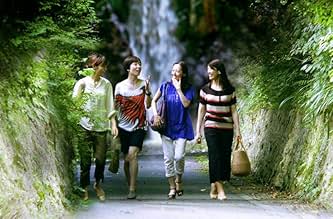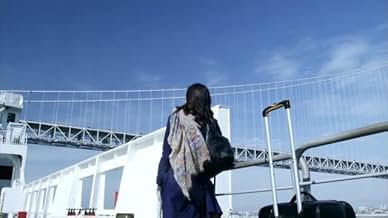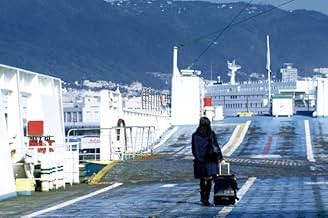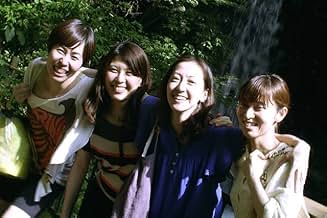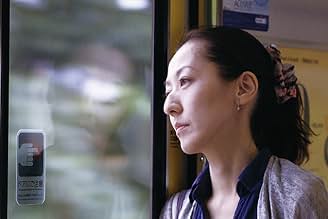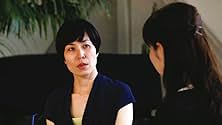AVALIAÇÃO DA IMDb
7,6/10
3,2 mil
SUA AVALIAÇÃO
Um épico de queima lenta que narra a jornada emocional de quatro mulheres de trinta e poucos anos na nebulosa cidade costeira de Kobe.Um épico de queima lenta que narra a jornada emocional de quatro mulheres de trinta e poucos anos na nebulosa cidade costeira de Kobe.Um épico de queima lenta que narra a jornada emocional de quatro mulheres de trinta e poucos anos na nebulosa cidade costeira de Kobe.
- Direção
- Roteiristas
- Artistas
- Prêmios
- 6 vitórias e 5 indicações no total
- Direção
- Roteiristas
- Elenco e equipe completos
- Produção, bilheteria e muito mais no IMDbPro
Avaliações em destaque
If you are willing to dedicate 5 hours of your time to watch Hamaguchi's Happy Hour, what you'll find is a cozy yet mildly depressing film perfect for those lonely, chilly winter nights alone.
The film strives to present themes about marriage, divorce, mid-life, relationships, love, and others in an extremely objective way. The dialogue in the café scene even explicitly states this, also inputting that while you can try to be objective, you are ultimately limited by your own experiences. How do you reach this hyper-realism? For one thing you can practically reduce editing to a minimum. The most stand out result of this is not cutting scenes out to pad out the run time. Even I, a person who loves this trend of extending run time in movies, had to split my viewing into 2-parts. However, this luxury of time gives the pacing a very natural feel; characters evolve very logically while not feeling rushed and long scenes of literally just shots of character's faces lets the audience see character's feelings change (or sometimes lack thereof) while not seeming abrupt at all. Another point is how the characters perform. The very amateurish quality in performance is reminiscent of films like Hong Sangsoo, a Korean director well known worldwide for his amateur style. The delivery of dialogue is very flat and relaxed, with only slight changes in intonation and volume for those extremely "dramatic" scenes. Characters display emotion with only subtle changes in facial expressions, or sometimes if they are sad, the director only presents them in the aftermath with their bloodshot eyes.
On the topic of dialogue, this film does suffer from some expository dialogue, a quality in a lot of French New Wave films that turns me off most of the time. I wish that in the 5-hour run time, Hamaguchi could have found more natural and normal ways of delivering dialogue.
How the film is presented is gorgeous. From watching some Ozu films, shot composition is very Japanese, a lot of intersecting lines into horizons and such. Color selection and camera positioning makes the film seem very disconnected from the characters, again contributing to the omniscient perspective of the film. And Kobe just seems like a pretty place to be. I especially loved the singles where the camera is placed right in front of the camera, like a Deacons/Cohen Brothers film making us intimate with the character while their cold expressions still leave a veil between us.
Overall, I think those who are willing to be active watchers for the 5-hour run time can get something out of watching this film, whether if it's about your marriage or if you happen to agree with these other reviews and find that women are evil (?). I personally thought that the main characters felt trapped by the societal pressures of mid-life (marriage, children, love) and that their actions to break out of those chains were out of their intolerance to be stuck in their societal roles as housewives. But the director's purposeful strategy of "present-how-it-is" kind of gives everyone the right to form and support their own ideals based on this film.
The film strives to present themes about marriage, divorce, mid-life, relationships, love, and others in an extremely objective way. The dialogue in the café scene even explicitly states this, also inputting that while you can try to be objective, you are ultimately limited by your own experiences. How do you reach this hyper-realism? For one thing you can practically reduce editing to a minimum. The most stand out result of this is not cutting scenes out to pad out the run time. Even I, a person who loves this trend of extending run time in movies, had to split my viewing into 2-parts. However, this luxury of time gives the pacing a very natural feel; characters evolve very logically while not feeling rushed and long scenes of literally just shots of character's faces lets the audience see character's feelings change (or sometimes lack thereof) while not seeming abrupt at all. Another point is how the characters perform. The very amateurish quality in performance is reminiscent of films like Hong Sangsoo, a Korean director well known worldwide for his amateur style. The delivery of dialogue is very flat and relaxed, with only slight changes in intonation and volume for those extremely "dramatic" scenes. Characters display emotion with only subtle changes in facial expressions, or sometimes if they are sad, the director only presents them in the aftermath with their bloodshot eyes.
On the topic of dialogue, this film does suffer from some expository dialogue, a quality in a lot of French New Wave films that turns me off most of the time. I wish that in the 5-hour run time, Hamaguchi could have found more natural and normal ways of delivering dialogue.
How the film is presented is gorgeous. From watching some Ozu films, shot composition is very Japanese, a lot of intersecting lines into horizons and such. Color selection and camera positioning makes the film seem very disconnected from the characters, again contributing to the omniscient perspective of the film. And Kobe just seems like a pretty place to be. I especially loved the singles where the camera is placed right in front of the camera, like a Deacons/Cohen Brothers film making us intimate with the character while their cold expressions still leave a veil between us.
Overall, I think those who are willing to be active watchers for the 5-hour run time can get something out of watching this film, whether if it's about your marriage or if you happen to agree with these other reviews and find that women are evil (?). I personally thought that the main characters felt trapped by the societal pressures of mid-life (marriage, children, love) and that their actions to break out of those chains were out of their intolerance to be stuck in their societal roles as housewives. But the director's purposeful strategy of "present-how-it-is" kind of gives everyone the right to form and support their own ideals based on this film.
Binged this 317-minute realistic drama about four female friends who come to grips with their feelings of doubt and disappointment as they enter middle age, in particular with the relational shortcomings of men. The slow, detailed narrative, with its prolonged scenes and interwoven story lines around a centering drama and unique structural elegance, mesmerized me. This is rare, meaty fare far afield from the happily-ever-after screenplays that are all too common among Japanese movies, at least the ones I've watched heretofore on Amazon Prime.
This starts out as a really interesting movie about four Japanese 30ish women and how they (mis)manage their lives and the lives of those around them in search of things we are never quite sure of. The film is very good at bringing you close to their world, but keeping you at arms length at the same time, and the characters take turns in being more or less likeable/relatable, but often come off as aliens floating through contemporary Japanese society and trying to communicate (or not- "communication" is the key theme).
I don't know the reality of said society, but I have met enough alienated and unhappy people in my own to suggest it rings true, specific cultural issues non-withstanding. That part of the movie was fascinating, including insights into family, divorce, relationships, honor, etc.
But the issue is not really the five-hour length, probably used to suggest the real-life unwinding of issues; although it doesn't help. For me the main problem was the long expository conversations/monologues, the many side stories and secondary characters popping in and out, the serious issues that come up with no background (that they have often no resolution is fine by me), and the fact the the actors often seem more part of an acting experiment using amateurs, than players in a movie, which actually seems to be the case. Most actors do a fine job (some are more wooden), but it does feel like an exercise.
As a "completist" that watches all movies to the end on principle, I nevertheless felt I would have gotten the same messages by watching any 90-120 minutes of the whole length.
This movie focuses on 4 Japanese women in their late thirties. We follow their daily lives and their personal journeys. These 4 friends realize that they are unhappy with their (love) lives and they try to take back control. Several interesting topics are addressed, such as the lack of communication in relationships, the emancipation of women and the quest for self-fulfillment. The 4 non professional actresses give good performances and we get attached to their characters. Being immersed in the Japanese culture is also an enlightening experience. However, the movie is long. Some cuts could have been made.
Worth it. It's long but you don't have to watch it all at once. It's a unique movie that foregrounds the slow details and nuances of the moments we experience. I think it expresses subtle, wordless feelings of magic and also anguish in searching for oneself and for fulfillment in our long (but short) lives.
I didn't always agree with the women in the movie but I related to how they were questioning the surface of themselves and their lives, searching for something more than what they'd fallen into or were told to be. The movie is humorous at times, depressing at times, and both. It left me with a feeling of silent reflection on the many sides to life and to people.
I didn't always agree with the women in the movie but I related to how they were questioning the surface of themselves and their lives, searching for something more than what they'd fallen into or were told to be. The movie is humorous at times, depressing at times, and both. It left me with a feeling of silent reflection on the many sides to life and to people.
Você sabia?
- CuriosidadesIn France, the film was released theatrically in three parts over three weeks, respectively dubbed "1&2", "3&4" and "5". The film was thus advertised as "The First Cinema TV Series".
Principais escolhas
Faça login para avaliar e ver a lista de recomendações personalizadas
- How long is Happy Hour?Fornecido pela Alexa
Detalhes
Bilheteria
- Faturamento bruto mundial
- US$ 337.256
- Tempo de duração5 horas 17 minutos
- Cor
- Proporção
- 1.85 : 1
Contribua para esta página
Sugerir uma alteração ou adicionar conteúdo ausente


